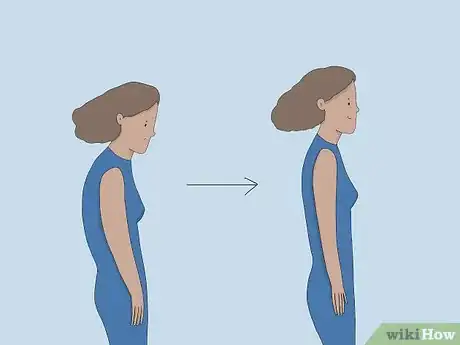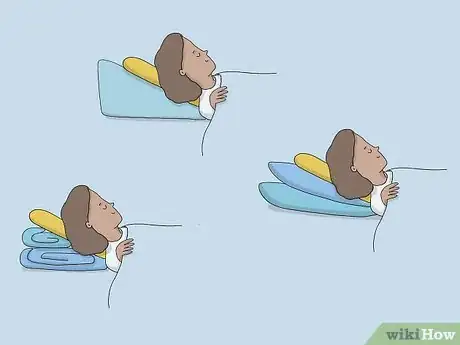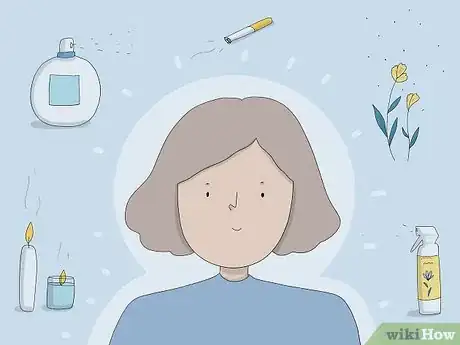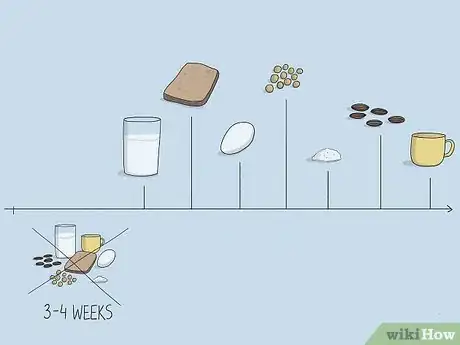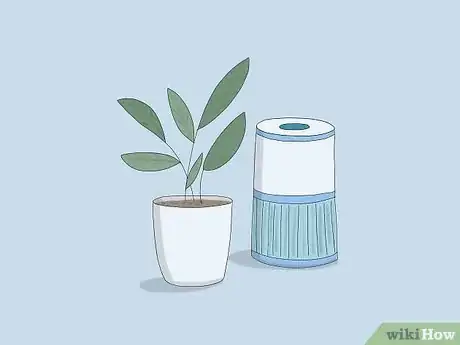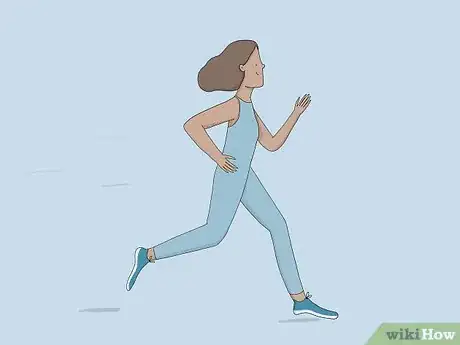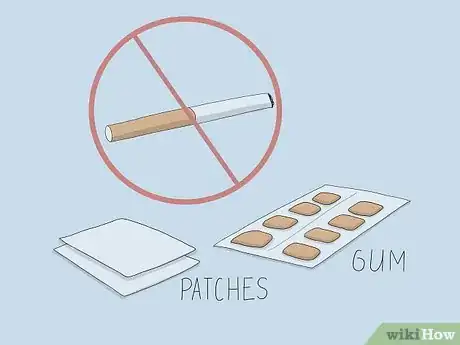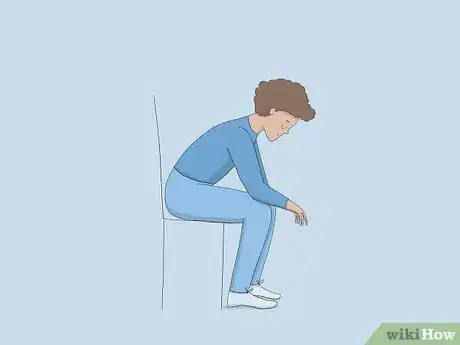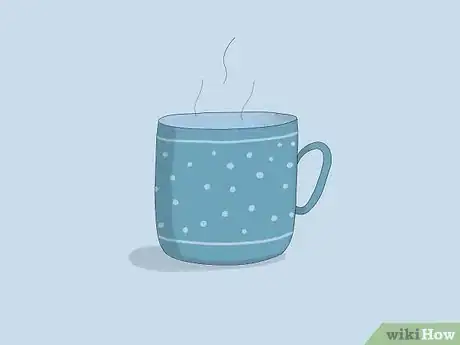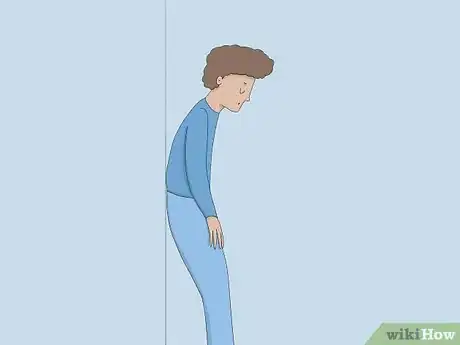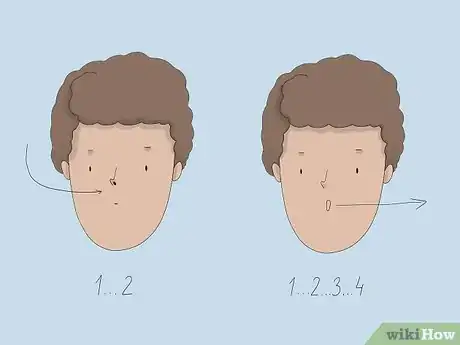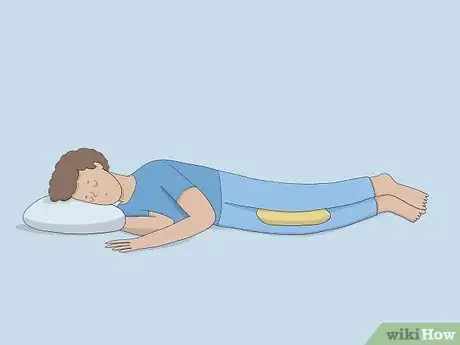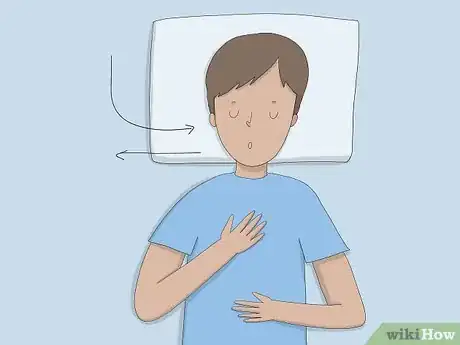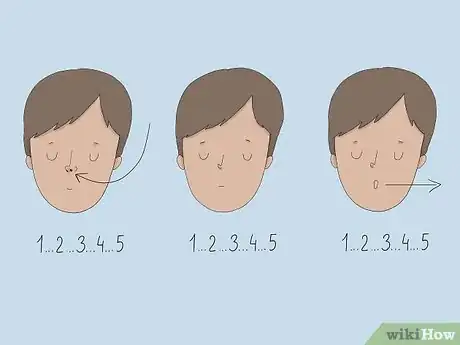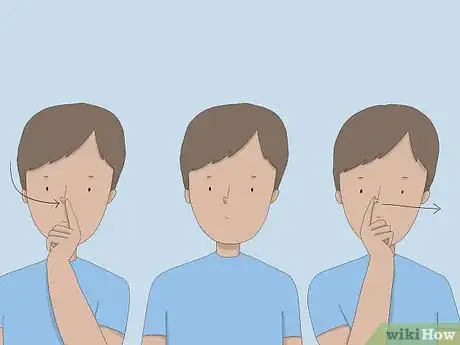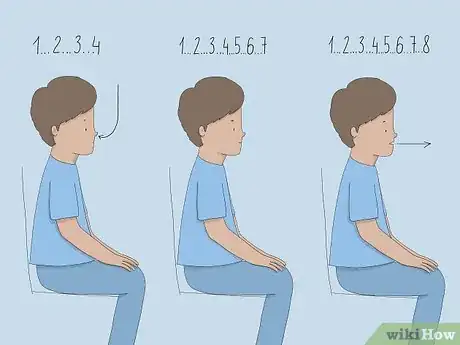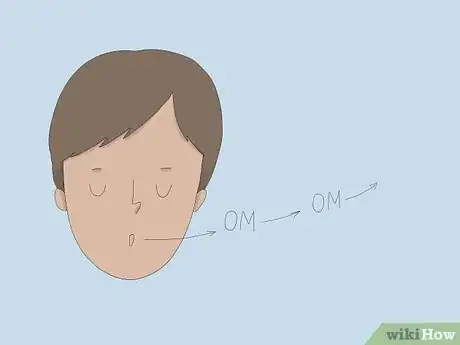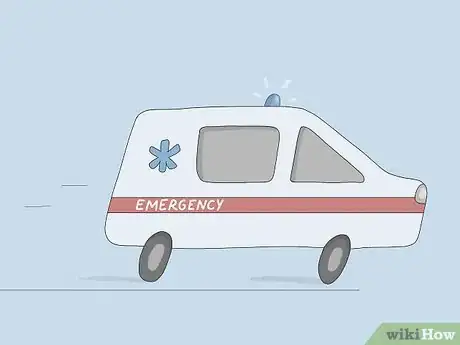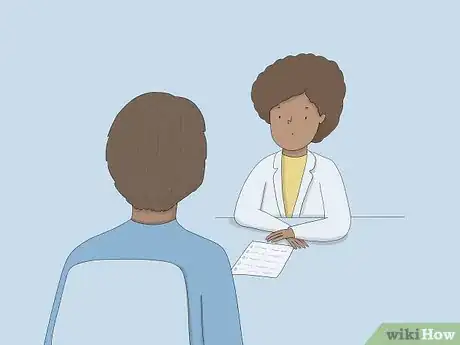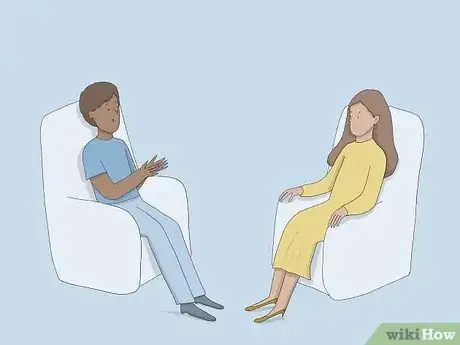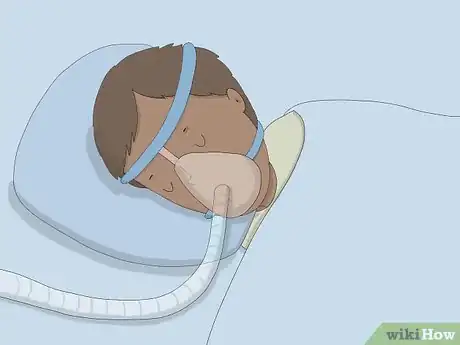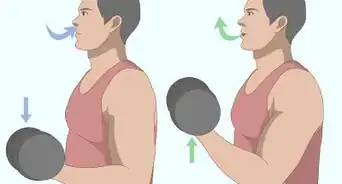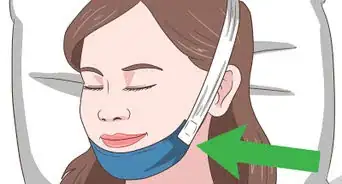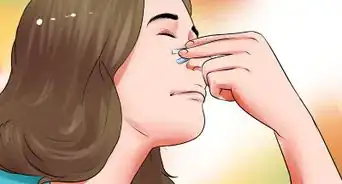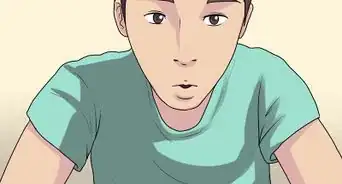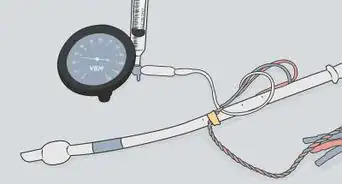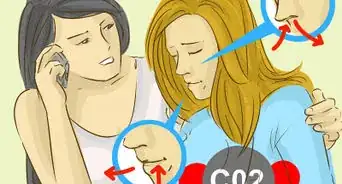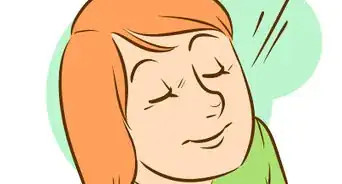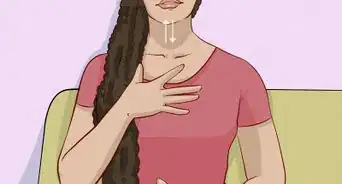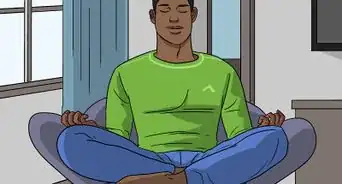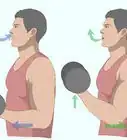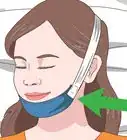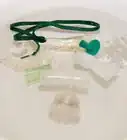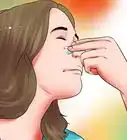This article was medically reviewed by Ni-Cheng Liang, MD and by wikiHow staff writer, Danielle Blinka, MA, MPA. Dr. Ni-Cheng Liang is a board certified Pulmonologist and the Director of Pulmonary Integrative Medicine at Coastal Pulmonary Associates affiliated with the Scripps Health Network in San Diego, California. She also serves as a Voluntary Assistant Professor of Medicine at the University of California San Diego School of Medicine while volunteering for the UCSD Medical Student-Run Free Clinic for uninsured patients. With over 15 years of experience, Dr. Liang specializes in pulmonary and respiratory medical concerns, mindfulness teaching, physician wellness, and integrative medicine. Dr. Liang received her Doctor of Medicine (MD) from the University of Maryland School of Medicine. Dr. Liang was voted as a San Diego Top Doctor in 2017 and 2019. She was also awarded the 2019 American Lung Association San Diego Lung Health Provider of the Year.
There are 16 references cited in this article, which can be found at the bottom of the page.
This article has been viewed 60,738 times.
Feeling like you can’t breathe well can be frightening and stressful. To help you breathe better, do breathing exercises to help you breathe deeply, calm down, and restore your natural breathing. Additionally, make lifestyle changes to improve your breathing. If you’re experiencing shortness of breath, try re-positioning your body to help you breathe easily. However, see your doctor if you’re struggling to breathe, you have breathing issues often, or you’re dealing with anxiety or panic attacks.
Steps
Making Lifestyle Changes
-
1Use good posture so it’s easier to breathe. Poor posture compresses your lungs and airways, making it harder for you to breathe. Improve your posture by straightening your spine when you’re sitting or standing. Additionally, roll your shoulders back and tilt your chin up. This may help you breathe better.[1]
- Look in the mirror to check out your posture. Practice standing or sitting up straight until it feels natural to you.
-
2Prop yourself up if you have trouble breathing while you're sleeping. You may struggle to breathe while you're lying down, especially at night. If this happens, use pillows or a wedge to prop up your upper body. This will take some of the pressure off your lungs so you can breathe better while you sleep.
- You might also try putting a folded blanket under your pillow.
Advertisement -
3Limit your exposure to air pollutants and irritants. Air pollution can affect your lungs and airways, making it harder for you to breathe. While you might not be able to avoid all air pollution, you can reduce your exposure to it. Here are some ways to avoid exposure to common air pollutants:[2]
- Avoid spending time outdoors around pollutants.
- Stay away from allergens.
- Don’t use perfumes and colognes.
- Stop using air fresheners.
- Pick fragrance-free personal care products and cleaners.
- Avoid burning candles or incense.
- Clean your home often to prevent dust and mold.
- Step away when someone is smoking to avoid second-hand smoke.
- Breathe through your nose instead of your mouth to naturally filter dust and irritants.[3]
-
4Do an elimination diet to help heal a leaky gut. If you're sensitive to a food you're eating, it may cause holes in your intestines that allow bacteria and food particles to escape into your body. This triggers inflammation and illness in your body as it tries to fight off the invaders. The inflammation can cause breathing issues and allergies. To help you heal, do an elimination diet to improve your gut health.[4]
- Eliminate common food allergies like milk, gluten, eggs, soy, sugar, nuts, and caffeine for 3-4 weeks. Once you start to feel better, add the foods back 1 at a time to see if they affect you. Stop eating any foods that make your symptoms return.
-
5Use an air filter to improve your indoor air quality. Unfortunately, the air inside your home may be full of indoor air pollutants. This can irritate your lungs and make it harder for you to breathe well. Luckily, indoor air filters might help filter out these pollutants so you breathe easier. Use HEPA filters to improve the air quality in your home.[5]
- Install HEPA filters in your air conditioning system. Additionally, you might get an air filter fan to improve the air quality.
- Indoor plants also improve the quality of your air. Incorporate your favorite indoor plants into your home decor to keep your air cleaner.
-
6Exercise for 30 minutes daily to improve your respiratory health. You might struggle to breathe after being active. Regular exercise can help you improve your physical fitness so you can breathe easier.[6] Do 30 minutes of moderate cardio exercise at least 5-6 days a week to help you get fit. Here are some exercises you might try:[7]
-
7Stop smoking if you do. You probably know that smoking affects your breathing, but quitting is extremely difficult.[8] Talk to your doctor about using quitting aids to help you stop smoking. This can help you take charge of your respiratory health.[9]
- For instance, your doctor might be able to give you patches, gum, or prescription medicine to help you deal with cravings. Additionally, they might help you find a support group that can help you stay strong.
Dealing with Shortness of Breath
-
1Sit down and lean forward, resting your elbows on your knees. Get comfortable in a chair with your feet flat on the floor, then lean your chest slightly forward. Bend your arms and place your elbows on top of your knees. Then, release any tension that you’re holding in your neck or shoulders. Stay in this position until your breathing returns to normal.[10]
- You should start to feel better in 2-3 minutes.
- You can also sit comfortably at a table with your arms folded on the table. Then, lean slightly forward and rest your head on your arms. Release any tension that you’re holding in your neck and shoulders.
-
2Drink warm fluids to relax your airways. Warm fluids naturally relax your airways and thin out any mucus that you may have. Sip on warm fluids when you're feeling like it's hard to breathe. This may help you breathe better.[11]
- For instance, you might drink warm tea or sip on warm water.
-
3Lean your hips against the wall, lean slightly forward, and relax. Stand with your back to the wall and your feet about hip-width apart. Lean slightly forward and place your hands on your thighs. Relax your shoulders and arms, then focus on your breathing. Stay in this position until your breathing returns to normal.[12]
- You should breathe easier in 2-3 minutes.
-
4Do pursed lip breathing if you’ve been active or anxious. Pursed lip breathing can help you ease shortness of breath caused by strenuous activity or anxiety.[13] Start by closing your mouth and slowly inhaling through your nose for a 2 count. Pucker your lips like you’re about to whistle, then slowly blow out the air to a count of 4.[14] Repeat until your breathing returns to normal.[15]
- You should feel better after 2-3 minutes of pursed lip breathing. If you don’t, you may need to try a different breathing exercise or you might need medical care.
- Incorporate pursed lip breathing into your daily routine to help control chronic breathing issues. Do it 4-5 times a day for 1-2 minutes to help you breathe better.
-
5Sleep on your side with a pillow between your knees. You might experience shortness of breath while you’re sleeping, especially if you’re sick or snore. To help yourself breathe better, turn onto your side to sleep. Place pillows under your head to prop up your upper body and put a pillow between your legs to align your spine.[16]
- If you have a tendency to roll into a different position, use blankets or pillows to prevent you from rolling over.
- If you prefer sleeping on your back, try elevating your head and knees. Place 2 pillows under your head to raise it. Then, place 2 pillows under your knees to lift them up, which will straighten your spine.
Doing Breathing Exercises
-
1Perform abdominal breathing to take deep breaths. Lie down in a comfortable position, then place one hand on your chest and the other on your abdomen. Slowly inhale through your nose to draw air into your abdomen.[17] Feel your abdomen rise under your hand. Then, slowly exhale through puckered lips. Repeat for 5-10 minutes.[18]
- The hand on your chest shouldn’t rise during this exercise. Only your abdomen should rise.
- Repeat this exercise 2-3 times a day to improve your breathing.
- As you get used to the exercise, you can do it sitting up. Eventually, you’ll be able to do it while standing.
-
2Do rhythmic breathing to calm yourself down. Focus on slowing down your breathing by counting as you inhale, hold your breath, and exhale. Inhale as you slowly count to 5, then hold your breath for a 5 count. Next, exhale as you slowly count to 5. Repeat 5 times to help you return your breathing to its natural rhythm.[19]
- It’s okay to vary your count. For instance, you might prefer to use a 3 count instead of a 5 count. Do what feels right to you.
-
3Use alternate nostril breathing to deal with stress. Place your finger over 1 nostril to close it off. Then, slowly inhale through your open nostril until your lungs are full. Hold the breath for 1 second, then close that nostril and slowly exhale through your other nostril. Inhale through that nostril, then close it off and exhale through the first nostril.[20]
- Continue to alternate nostrils for 3-5 minutes to help restore natural breathing.
-
4Perform the 4-7-8 breathing technique to help you relax. Sit with your back straight, then place your tongue behind your teeth. Exhale through your mouth without moving your tongue to empty your lungs. Close your mouth, then inhale through your nose for a 4 count. Then, hold your breath for a 7 count. Exhale with a whoosh as you count to 8.[21]
- Take a total 4 of 4-7-8 breaths to help you feel calm and relaxed.
-
5Breathe in slowly then hum on your exhale to slow your breathing. Slowly inhale through your nose until your lungs feel full. Then, make a low humming sound as you exhale through your mouth. Continue to hum until your lungs are empty. This can help you slow down your breath, which relaxes you.[22]
- Repeat this for several breaths to help you slow down your breathing.
- If you like, say a mantra like “Om” as you exhale.
Seeking Medical Care
-
1Get immediate medical care if you’re struggling to breathe. Try not to worry, but shortness of breath can be a life-threatening symptom. If you’re unable to catch your breath, call for help or have someone drive you to an emergency room. This will help you get the treatment you need to help you breathe easier.[23]
- Don’t try to drive yourself to the doctor if you’re having trouble breathing. Always get someone else to drive you so that you get to doctor safely.
-
2See your doctor if you’re having trouble breathing regularly. While you probably don’t need to worry, breathing issues can become serious. It’s possible you have a medical condition that’s causing your breathing issues.[24] Your doctor can give you a proper diagnosis so you can begin treatment.[25]
- For instance, you might have asthma that requires treatment with inhaled steroids. You could also have a condition like chronic obstructive pulmonary disease (COPD).
- Tell your doctor about any other symptoms you’re having and how long you’ve been having symptoms.
-
3See a therapist to help you with anxiety or panic attacks. Chronic anxiety and panic disorders may make it difficult for you to breathe. If this is the case for you, work with a therapist who can help you manage your condition. They’ll help you change your thoughts and behaviors so you can improve your breathing.[26]
- Ask your doctor for a referral to a therapist or look for one online.
- Your therapy appointments may be covered by insurance, so check your benefits.
- If you're having anxiety or panic attacks daily, your doctor or therapist may prescribe medication to help you manage your condition. This might help you get relief.
-
4Talk to your doctor if you have symptoms of sleep apnea. You might have trouble breathing in your sleep, which is called sleep apnea. This condition can be life threatening if you don't get treatment. Fortunately, your doctor can prescribe a continuous positive airway pressure (CPAP) machine to help you breathe at night. See your doctor if you have the following symptoms of sleep apnea:[27]
- Waking up with a dry mouth
- Loud snoring
- Gasping for air while you're asleep
- Morning headaches
- Trouble staying asleep
- Extreme tiredness
- Trouble concentrating
- Being irritable
Expert Q&A
-
QuestionHow can I fix my breathing?
 Ni-Cheng Liang, MDDr. Ni-Cheng Liang is a board certified Pulmonologist and the Director of Pulmonary Integrative Medicine at Coastal Pulmonary Associates affiliated with the Scripps Health Network in San Diego, California. She also serves as a Voluntary Assistant Professor of Medicine at the University of California San Diego School of Medicine while volunteering for the UCSD Medical Student-Run Free Clinic for uninsured patients. With over 15 years of experience, Dr. Liang specializes in pulmonary and respiratory medical concerns, mindfulness teaching, physician wellness, and integrative medicine. Dr. Liang received her Doctor of Medicine (MD) from the University of Maryland School of Medicine. Dr. Liang was voted as a San Diego Top Doctor in 2017 and 2019. She was also awarded the 2019 American Lung Association San Diego Lung Health Provider of the Year.
Ni-Cheng Liang, MDDr. Ni-Cheng Liang is a board certified Pulmonologist and the Director of Pulmonary Integrative Medicine at Coastal Pulmonary Associates affiliated with the Scripps Health Network in San Diego, California. She also serves as a Voluntary Assistant Professor of Medicine at the University of California San Diego School of Medicine while volunteering for the UCSD Medical Student-Run Free Clinic for uninsured patients. With over 15 years of experience, Dr. Liang specializes in pulmonary and respiratory medical concerns, mindfulness teaching, physician wellness, and integrative medicine. Dr. Liang received her Doctor of Medicine (MD) from the University of Maryland School of Medicine. Dr. Liang was voted as a San Diego Top Doctor in 2017 and 2019. She was also awarded the 2019 American Lung Association San Diego Lung Health Provider of the Year.
Board Certified Pulmonologist If you're currently a smoker, do what you can to quit. Even within a day, your lungs will feel less inflamed and you'll start feeling better.
If you're currently a smoker, do what you can to quit. Even within a day, your lungs will feel less inflamed and you'll start feeling better. -
QuestionIs it better to breathe through your nose or your mouth?
 Monica Kieu, DO, FACSDr. Monica Kieu is a board certified Otolaryngologist and Specialist in Facial Plastic and Reconstructive Surgery in Los Angeles, California. Dr. Kieu received a BS in Anthropology from the University of California, Riverside and earned her medical degree (DO), with honors, from Western University of Health Sciences in Pomona. She then completed her residency in Otolaryngology-Head and Neck Surgery at Michigan State University/Detroit Medical Center, where she served as chief resident. Dr. Kieu also completed a prestigious fellowship in Facial Plastic and Reconstructive Surgery at the University of Toronto. She is a member of the American Academy of Otolaryngology-Head and Neck Surgery, American Osteopathic Colleges of Ophthalmology and Otolaryngology-Head and Neck Surgery, American Academy of Cosmetic Surgery, American Academy of Facial Plastic and Reconstructive Surgery, and the American Rhinologic Society. Dr. Kieu was recently named one of LA’s Top Docs by Los Angeles Magazine.
Monica Kieu, DO, FACSDr. Monica Kieu is a board certified Otolaryngologist and Specialist in Facial Plastic and Reconstructive Surgery in Los Angeles, California. Dr. Kieu received a BS in Anthropology from the University of California, Riverside and earned her medical degree (DO), with honors, from Western University of Health Sciences in Pomona. She then completed her residency in Otolaryngology-Head and Neck Surgery at Michigan State University/Detroit Medical Center, where she served as chief resident. Dr. Kieu also completed a prestigious fellowship in Facial Plastic and Reconstructive Surgery at the University of Toronto. She is a member of the American Academy of Otolaryngology-Head and Neck Surgery, American Osteopathic Colleges of Ophthalmology and Otolaryngology-Head and Neck Surgery, American Academy of Cosmetic Surgery, American Academy of Facial Plastic and Reconstructive Surgery, and the American Rhinologic Society. Dr. Kieu was recently named one of LA’s Top Docs by Los Angeles Magazine.
Board Certified Otolaryngologist Breathing from the nose is much more preferred than breathing through the mouth. The nose improves your lungs' ability to absorb oxygen. It also filters out small particles and pollen, and it moisturizes and warms the air that you breathe.
Breathing from the nose is much more preferred than breathing through the mouth. The nose improves your lungs' ability to absorb oxygen. It also filters out small particles and pollen, and it moisturizes and warms the air that you breathe. -
QuestionIs it possible to breathe incorrectly?
 Luba Lee, FNP-BC, MSLuba Lee, FNP-BC is a Board-Certified Family Nurse Practitioner (FNP) and educator in Tennessee with over a decade of clinical experience. Luba has certifications in Pediatric Advanced Life Support (PALS), Emergency Medicine, Advanced Cardiac Life Support (ACLS), Team Building, and Critical Care Nursing. She received her Master of Science in Nursing (MSN) from the University of Tennessee in 2006.
Luba Lee, FNP-BC, MSLuba Lee, FNP-BC is a Board-Certified Family Nurse Practitioner (FNP) and educator in Tennessee with over a decade of clinical experience. Luba has certifications in Pediatric Advanced Life Support (PALS), Emergency Medicine, Advanced Cardiac Life Support (ACLS), Team Building, and Critical Care Nursing. She received her Master of Science in Nursing (MSN) from the University of Tennessee in 2006.
Board-Certified Family Nurse Practitioner There's no right or wrong way to breathe, but there are optimal ways of breathing. When you're born, your body knows its innate or "correct" way of breathing, but you might forget what works best for you. Additionally, things like allergies, stress, and illness can interfere. Breathing mindfully can help you get the most out of each breath.
There's no right or wrong way to breathe, but there are optimal ways of breathing. When you're born, your body knows its innate or "correct" way of breathing, but you might forget what works best for you. Additionally, things like allergies, stress, and illness can interfere. Breathing mindfully can help you get the most out of each breath.
Warnings
- If you’re having trouble breathing, see your doctor immediately.⧼thumbs_response⧽
References
- ↑ https://medlineplus.gov/guidetogoodposture.html
- ↑ https://www.mayoclinic.org/symptoms/shortness-of-breath/basics/when-to-see-doctor/sym-20050890
- ↑ Ni-Cheng Liang, MD. Board Certified Pulmonologist. Expert Interview. 18 June 2021.
- ↑ https://www.ncbi.nlm.nih.gov/pmc/articles/PMC5871166/
- ↑ https://intermountainhealthcare.org/blogs/topics/live-well/2017/12/do-indoor-air-filters-really-help-you-breathe-easier/
- ↑ Ni-Cheng Liang, MD. Board Certified Pulmonologist. Expert Interview. 18 June 2021.
- ↑ https://www.mayoclinic.org/symptoms/shortness-of-breath/basics/when-to-see-doctor/sym-20050890
- ↑ Ni-Cheng Liang, MD. Board Certified Pulmonologist. Expert Interview. 18 June 2021.
- ↑ https://www.nhs.uk/live-well/quit-smoking/
- ↑ https://my.clevelandclinic.org/health/articles/9446-positions-to-reduce-shortness-of-breath
- ↑ https://www.mayoclinic.org/symptoms/wheezing/basics/when-to-see-doctor/sym-20050764?p=1
- ↑ https://my.clevelandclinic.org/health/articles/9446-positions-to-reduce-shortness-of-breath
- ↑ https://medlineplus.gov/ency/patientinstructions/000053.htm
- ↑ Ni-Cheng Liang, MD. Board Certified Pulmonologist. Expert Interview. 18 June 2021.
- ↑ https://my.clevelandclinic.org/health/articles/9443-pursed-lip-breathing
- ↑ https://my.clevelandclinic.org/health/articles/9446-positions-to-reduce-shortness-of-breath
- ↑ Ni-Cheng Liang, MD. Board Certified Pulmonologist. Expert Interview. 18 June 2021.
- ↑ https://www.copdfoundation.org/Learn-More/I-am-a-Person-with-COPD/Breathing-Techniques.aspx
- ↑ https://www.scientificamerican.com/article/proper-breathing-brings-better-health/
- ↑ https://www.scientificamerican.com/article/proper-breathing-brings-better-health/
- ↑ https://www.cordem.org/globalassets/files/academic-assembly/2017-aa/handouts/day-three/biofeedback-exercises-for-stress-2---fernances-j.pdf
- ↑ https://www.psychologytoday.com/us/blog/memory-medic/201908/learn-breathe-better-health
- ↑ https://www.mayoclinic.org/symptoms/shortness-of-breath/basics/when-to-see-doctor/sym-20050890
- ↑ Ni-Cheng Liang, MD. Board Certified Pulmonologist. Expert Interview. 18 June 2021.
- ↑ https://www.mayoclinic.org/symptoms/shortness-of-breath/basics/when-to-see-doctor/sym-20050890
- ↑ https://www.psychologytoday.com/us/blog/body-sense/201009/waiting-exhale
- ↑ https://www.mayoclinic.org/diseases-conditions/sleep-apnea/symptoms-causes/syc-20377631
